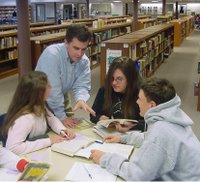 Been thinking about money lately. Not because the economy has dominated the news for the last six months. And not because I won the lottery, that's for sure.
Been thinking about money lately. Not because the economy has dominated the news for the last six months. And not because I won the lottery, that's for sure.
I've been reading a wonderful blog with a great title - Get Rich Slowly. Although the blog is not written for educators or to explore the digital possibilities of web 2.0 applications, it is one of my favorite regular reads. The blog is devoted to "sensible personal finance," preaching patience as a core belief. That appeals to me, whether we're talking about money or my own professional practice in the classroom. It's also a good reminder for these down times when I feel more frustrated than excited.
Get Rich Slowly is well-written, relevant, and thought-provoking - everything a blog should be. While I enjoy it for it's own sake, the teacher part of me wonders what part of the author's educational experiences prepared him for what he's doing with this blog?
Blog author J.D. describes the blog this way: "You will not find any get-rich-quick schemes here. Nor will you find multi-level marketing fads or hot stock tips. I am not pitching any product or book. Instead, you’ll find daily information about personal finance and related topics... Please note that I am not a financial professional. I’m just an average guy who found himself deep in debt. When it finally became too overwhelming, I began reading personal finance books, hoping to find answers. I wanted swift solutions to my problems. My research revealed that few people get rich quickly, but almost anyone can get rich slowly by patiently following some simple rules."
We can all stand to embrace such a philosophy. First of all, it must be obvious that if more people in this country adopted such a frugal, long view philosophy, then we might not be in the mess we are right now. As classroom teachers trying to make sense of the radically changing educational landscape, we need also to remind ourselves of the sound thinking espoused in Get Rich Slowly. If we want to get "rich," we need to take a long view and be satisfied with incremental steps towards our ultimate goal.
The idea of getting rich and teaching students share many parallels. In the classroom, my ultimate goal is for students to learn the literacy skills necessary to be successful in a changing and increasingly diverse global community. But it's not like I'm ever going to show up for school one day and declare mission accomplished. It just does not work that way. That can also be said for getting rich. To me, it's more about adopting a philosophy than reaching a concrete goal.
With a little tweaking of the 12 key beliefs that form the core of the Get Rich Slow philosophy, I can inform my own teaching and professional growth. In the interest of brevity, here are some highlights of the key beliefs as they apply to enriching our craft by incorporating relevant 21st Century skills and using powerful web 2.0 technology in our classrooms.
- Small amounts matter.
- Don’t be frustrated if the teacher next to you seems like a tech genius and you are still getting comfortable with a computer. Try out a new tool with a small lesson or a part of an assignment. You have to start somewhere, and saying you could never do it like Mr. Tech Wizard is a lame excuse.
- Do what works for you.
- Each person is different. What works for one person may not work for another. There’s no one right way to teach 21st Century skills or use technology efficiently as part of the learning process. Be willing to experiment until you find methods that are suited to your class.
- The perfect is the enemy of the good.
- Here's one area where too many teachers get stuck. Too many people are reluctant to start because they don’t know what the best first step is. The best first step is the one you take. Don’t worry about getting things exactly right.
- Failure is okay.
- Just don't give up. 'Nuff said.
- Do it now.
- It’s easy to put things off. But the sooner your start moving toward your goals, the easier they are too reach.
Food for thought...






